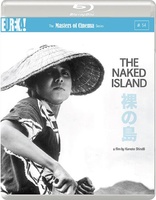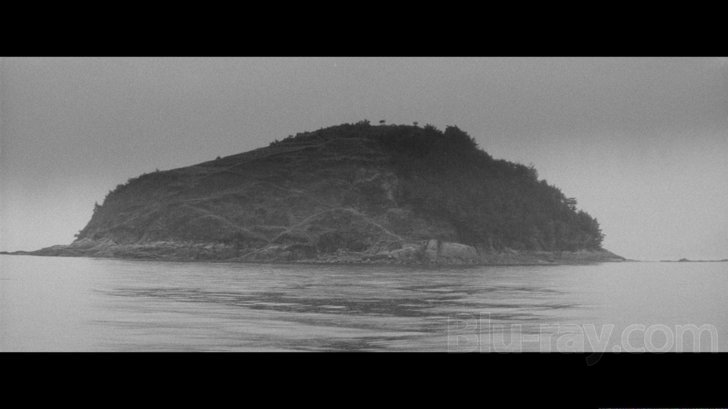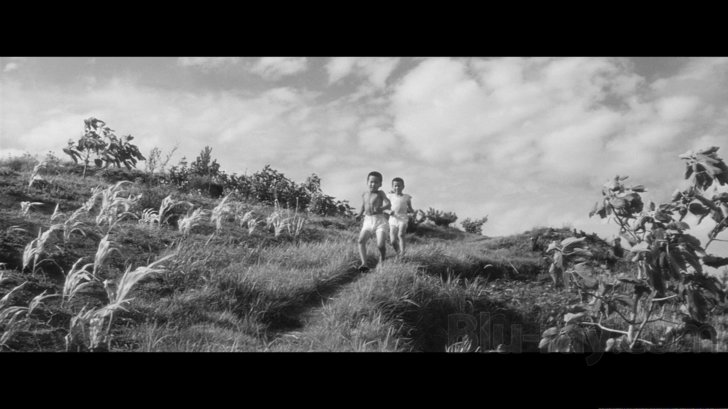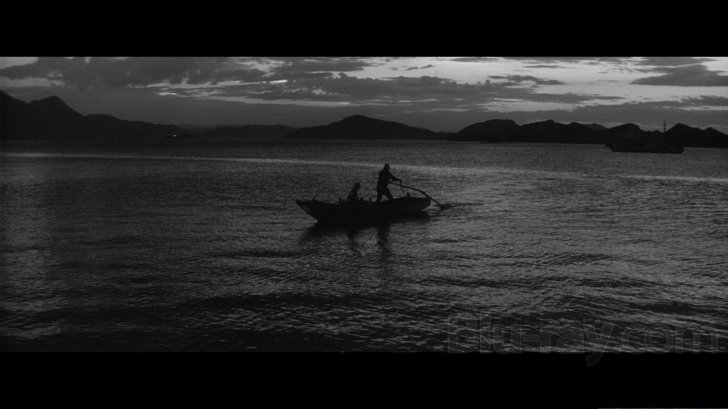The Naked Island Blu-ray Movie
HomeThe Naked Island Blu-ray Movie 
裸の島 / Hadaka no shima | Masters of CinemaEureka Entertainment | 1960 | 96 min | Rated BBFC: U | Jun 24, 2013

Movie rating
8.1 | / 10 |
Blu-ray rating
| Users | 0.0 | |
| Reviewer | 4.5 | |
| Overall | 4.5 |
Overview
The Naked Island (1960)
The film depicts a small family, a husband and wife and two sons, struggling to get by on a tiny island in the Seto Inland Sea, over the course of a year. They are the island's only occupants, and survive by farming. They must repeatedly carry the water for their plants and themselves in a row boat from a neighboring island...
Starring: Nobuko Otowa, Taiji Tonoyama, Shinji Tanaka, Masanori HorimotoDirector: Kaneto Shindô
| Foreign | Uncertain |
| Drama | Uncertain |
Specifications
Video
Video codec: MPEG-4 AVC
Video resolution: 1080p
Aspect ratio: 2.46:1
Original aspect ratio: 2.35:1
Audio
Japanese: LPCM Mono (48kHz, 24-bit)
48 kHz / 1152 kbps / 24-bit
Subtitles
English
Discs
50GB Blu-ray Disc
Single disc (1 BD)
Playback
Region B (locked)
Review
Rating summary
| Movie | 5.0 | |
| Video | 4.5 | |
| Audio | 4.5 | |
| Extras | 2.5 | |
| Overall | 4.5 |
The Naked Island Blu-ray Movie Review
Reviewed by Dr. Svet Atanasov July 8, 2013Kaneto Shindo's "The Naked Island" (1960) arrives on Blu-ray courtesy of British distributors Eureka Entertainment. The supplemental features on the disc include an audio commentary with the Japanese director and his longtime composer and friend Hikaru Hayashi, and a short video introduction by director Alex Cox. The release also arrives with a 32-page illustrated booklet featuring an essay by Acquarello, and a reprint of film critic and scholar Joan Mellen's interview with Kaneto Shindo from Voices from the Japanese Cinema. In Japanese, with optional English subtitles for the main feature. Region-B "locked".

The island
The film follows closely a family of four living on a small island in the Setonaikai archipelago. The place is indescribably beautiful but lonely. It almost seems like it exist in a different era -- there is no drinking water, electricity, or another human being the father (Taiji Tonoyama), the mother (Nobuko Otowa) and their two boys (Shinji Tanaka and Masanori Horimoto) can talk to.
Each day the father and the mother make multiple trips to a larger neighboring island where they collect fresh water in large buckets and then bring them back home. The buckets are so heavy that carrying them up the hill seems like a cruel punishment. But the plants in the fields next to the shack where the family lives have to be irrigated – the family’s survival depends on them.
The boys try to help as much as they can. When it is time to eat, they bring the food to the table and later on quickly clean up. The boys would also go fishing while their parents are away. The mother occasionally takes one of the boys to the larger island where he goes to school. The few sequences where he patiently waits for her boat to appear and take him back home are amongst the most beautiful in the entire film.
There are two major events in the film that disrupt the family’s daily routine. First, one of the boys catches a rather big fish. The whole family then heads to the larger neighboring island to sell the fish. It isn’t easy, but eventually they get a good deal on it in a small deli. With the money the father is paid the family has lunch in a modest eatery. Later on, each boy gets a gift from the mother – a plain white shirt.
The second event is a tragedy that changes everything -- at least for awhile. Then everything goes back to normal.
Kaneto Shindo’s Hadada no shima a.k.a. The Naked Island might be one of the purest and most beautiful Japanese films ever made. It is almost completely devoid of dialog -- the first time the father utters a word is well after the forty-minute mark -- but it allows the viewer to completely immerse into the primitive world of contrasts where the family struggles to survive and share their pain and joy. All of this is done without even a whiff of melodrama, without even a hint of politicizing.
The camera carefully observes the family, but Shindo’s technique has little in common with the manner in which the great Yasujiro Ozu observes the main protagonists in his films. In Ozu’s films space and positioning are of utmost importance, while camera movement is extremely limited. In Naked Island there is a sense of freedom that permeates the entire film, but also a feeling that things are as they are because life is a repetitive series of cycles. The film simply chronicles a few of these cycles as experienced by the family on the lonely island.
Naked Island was shot with a very small budget but cinematographer Kiyomi Kuroda's lensing is quite extraordinary. The beautiful panoramic shots from the island, in particular, are simply stunning. There are a few panoramic shots with the mother in a small boat slowly approaching the larger island that are also incredibly beautiful. (Shindo and Kuroda also collaborated on the equally atmospheric Onibaba and Kuroneko).
The calming soundtrack that compliments the striking visuals in The Naked Island was created by Hikaru Hayashi (Kinuyo Tanaka’s Love Under the Crucifix, Mikio Naruse’s The Stranger Within a Woman).
The Naked Island Blu-ray Movie, Video Quality 

Presented in an aspect ratio of 2.46:1, encoded with MPEG-4 AVC and granted a 1080p transfer, Kaneto Shindo's The Naked Island arrives on Blu-ray courtesy of British distributors Eureka Entertainment.
The high-definition transfer is beautiful. Image depth and clarity are very pleasing during the daylight footage as well as during the few nighttime sequences (see screencaptures #3 and 5). Contrast levels remain stable throughout the entire film. The blacks, whites, and the variety of grays are well balanced. There are absolutely no traces of problematic denoising corrections. Sharpening adjustments have not been performed either. Predictably, the film has a terrific and very consistent organic look. Compression is also very good. Purely transfer-specific anomalies, such as banding or aliasing, are nowhere to be seen. The film has also been carefully cleaned up. There are no large cuts, damage marks, or warps. A couple of tiny scratches, vertical lines and stains remain, but I suspect that they were left in order to preserve the integrity of the image. All in all, this is a wonderful presentation of Naked Island which is guaranteed to impress those who are going to see the film for the first time as well as those who have previously seen it on DVD. (Note: This is a Region-B "locked" Blu-ray release. Therefore, you must have a native Region-B or Region-Free PS3 or SA in order to access its content).
The Naked Island Blu-ray Movie, Audio Quality 

There is only one standard audio track on this Blu-ray release: Japanese LPCM 1.0. For the record, Eureka Entertainment have provided optional English subtitles. When turned on, they appear inside the image frame.
The film is virtually dialog-free, but it has a beautiful soundtrack that greatly benefits from the lossless treatment. Overall dynamic movement is quite modest, but clarity and depth are very good. Background hiss is not an issue of concern. Also, there are no problematic audio dropouts or distortions to report in this review.
The Naked Island Blu-ray Movie, Special Features and Extras 

- Introduction - a short video introduction by director Alex Cox (Repo Man). In English, not subtitled. (9 min).
- Commentary - this audio commentary was also included on Eureka Entertainment's R2 DVD release of The Naked Island. It was recorded in Japan in 2000 and features director Kaneto Shindo and his longtime composer and friend Hikaru Hayashi. In Japanese, with optional English subtitles.
- Booklet - 32-page illustrated booklet featuring an essay by Acquarello, and a reprint of film critic and scholar Joan Mellen's interview with director Kaneto Shindo from Voices from the Japanese Cinema (1975).
The Naked Island Blu-ray Movie, Overall Score and Recommendation 

Kaneto Shindo's The Naked Island might be one of the purest and most beautiful Japanese films ever made. Its poetic freedom and elegance are as striking as those witnessed in the films of Michelangelo Antonioni, Mikhail Kalatozov, and Miklos Jancso. Eureka Entertainment's presentation of the film is simply outstanding. I liked it so much that even though it is only July, I can guarantee that the Blu-ray release will appear on my Top 10 list at the end of year. VERY HIGHLY RECOMMENDED.
Similar titles
Similar titles you might also like

24 Frames
۲۴ فریم
2017

Leviathan
Левиафан / Leviafan
2014

Maborosi
幻の光 / Maboroshi no hikari
1995

Our Little Sister
海街diary / Umimachi Diary
2015

Zama
2017

Aquarius
Arrow Academy
2016

The Love of a Woman
L'amour d'une femme / Arrow Academy
1953

La Strada
Vintage World Cinema
1954

A Scene at the Sea
あの夏、いちばん静かな海。/ Ano natsu, ichiban shizukana umi
1991

Loveless
Нелюбовь / Nelyubov
2017

Port of Call
Hamnstad
1948

The Valley (Obscured by Clouds)
La Vallée
1972

La Dolce Vita
1960

Compartment No. 6
Hytti nro 6
2021

La terra trema
The Earth Trembles | Limited Edition
1948

Elena
Елена
2011

Three Monkeys
Üç maymun / Les trois singes
2008

Early Summer / What Did the Lady Forget
麦秋 / Bakushū / The Ozu Collection
1951

Sansho the Bailiff
山椒大夫 / Sanshô dayű
1954

A Fantastic Woman
Una Mujer Fantástica
2017